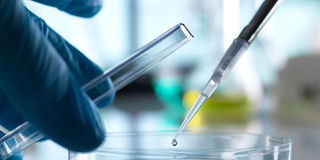What’s the link between science, human rights and well-being?

A researcher at work. Science is a relay we are all running in. None of us can afford to drop the baton. PHOTO | FILE | NATION MEDIA GROUP
What you need to know:
- The right is not demanding public accountability; rather it is a call for knowledge-sharing and public inclusion in the great scientific advancements. We are all dependant on science.
- We all have a common goal to maintain peace. Science is a partnership that is done globally that goes beyond our country and region.
Today, we mark the World Science Day for Peace and Development. This is a good opportunity to ask; has science contributed to your personal peace and development or that of our country?
To answer that question correctly you would need to be well-informed about the scientific developments.
Seventy years ago the United Nations, in the Universal Declaration of Human Rights, declared in Article 27 that "everyone has the right freely to participate in the cultural life of the community, to enjoy the arts and to share in scientific advancement and its benefits". That is partly why this year’s theme is “Science, a human right”.
In your life experience, have you found science to be an inherent right that has been both guaranteed and granted?
Have you felt included in scientific advancements and shared in its benefits? It is irrefutable that we have all been beneficiaries of science, especially through medicine.
HUMAN RIGHT
This day calls for greater inclusion of the wider public in debates and participation in emerging scientific issues. Why?
Now more than ever, we need to be better informed of the role scientists play in enhancing our lives, broadening our understanding of the continued role science has and will have in our everyday life and environment.
But, all this is dependent on the gate keepers of science. Scientists are the key holders of the scientific knowledge and if this is not shared with the public, we lack know how of how or where to publicly participate in ongoing scientific developments.
More keenly, if it is not required of scientists to engage with the public in conversation and debate, they will neglect our human right to scientific knowledge while paying all attention to the science.
The responsibility of according this right may not wholly be on the scientific community if there is no one advocating for science as a human right.
MEDICINE
For clarity, the right is not demanding public accountability; rather it is a call for knowledge-sharing and public inclusion in the great scientific advancements. We are all dependant on science.
What scientists are constantly working on could not only be of great benefit to us but to future generations too. If our immediate participation could spur on and expedite the success of the scientists' work, it is not only of benefit to them but to the wider community.
Of practical application and urgency that come to mind is medicine. How many sciences can you name that come into play here? Biology, physics, engineering, information technology, chemistry et al.
Does this now feel of everyday relevance to you? Curiously, what is the level of public participation when it comes to medical trials?
FOOD SECURITY
Another vital scientific need is food security, which currently forms part of the Big Four Agenda.
How is genetically modified food of benefit to us given the periodic occurrence of droughts and famine?
Beyond food consumption, is there better crop protection to the advantage of farmers and in the long-run the country wealth? Or comparatively, are we better off sticking to organic foods and is this sustainable?
These are all questions only better and correctly answered by scientists going beyond the science and remembering who the beneficiaries are and engaging the public.
Science is a matter of great public interest that greatly affects many facets of our everyday life. Like other public interest, there should be no reservations in sharing in scientific developments.
PEACE
More laterally, the human rights that we profoundly seek to uphold interlink with science.
The right to life when we are unwell depends on science and advancements in medicine; it also works with the right to a clean and healthy environment.
If science succeeds, other rights succeed too and if it fails other rights suffer. However, for all of humanity to thrive, we need science and peace.
We all have a common goal to maintain peace. Science is a partnership that is done globally that goes beyond our country and region.
If one of these areas is in civil unrest and research in these areas is impaired, it is to the great detriment of our lives and our human rights.
For there to be any form of scientific growth, knowledge-sharing and public participation, there must be peace.
Science for peace seamlessly contributes to the development of the sustainable development goal to promote peaceful and inclusive societies then later to sustaining them.
Science is a relay we are all running in. None of us can afford to drop the baton. Let us all work to uphold science and recognise it as a human right.
Ms Burini works with an international airline on dispute resolution. [email protected]





